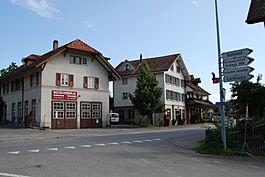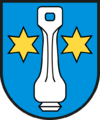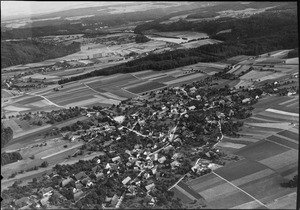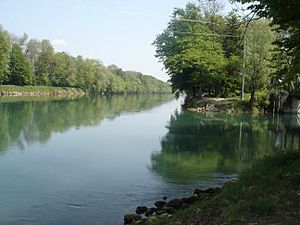Kallnach facts for kids
Quick facts for kids
Kallnach
|
||
|---|---|---|
 |
||
|
||
| Country | Switzerland | |
| Canton | Bern | |
| District | Seeland | |
| Area | ||
| • Total | 15.19 km2 (5.86 sq mi) | |
| Elevation | 445 m (1,460 ft) | |
| Population
(Dec 2020 )
|
||
| • Total | 2,220 | |
| • Density | 146.1/km2 (378.5/sq mi) | |
| Postal code |
3283
|
|
| Surrounded by | Bargen, Finsterhennen, Fräschels (FR), Kerzers (FR), Niederried bei Kallnach, Siselen, Treiten | |
Kallnach (also known as Chouchignies in French) is a small town in Switzerland. It's located in the Seeland area of the Bern canton. On January 1, 2019, another town called Golaten joined with Kallnach.
Contents
History of Kallnach
Kallnach has a long history! It was first mentioned way back in 1231.
Long, long ago, during the Bronze Age, people used to make metal objects here. There was also a small Roman settlement or a place where travelers could stop. A Roman road that connected important Roman cities like Aventicum and Augusta Raurica passed right through Kallnach. We know people lived here in the Early Middle Ages too, because a graveyard from that time was found.
Over the centuries, different powerful families and monasteries owned parts of Kallnach. Eventually, in the 1500s, the city of Bern bought the village. This made Kallnach part of Bern's territory.
The village church was built in 1608. It was built on top of an even older church from the Middle Ages.
For a long time, Kallnach faced a big problem: floods! The nearby Grosses Moos marsh would often overflow. But thanks to special projects between 1868 and 1971, the flooding stopped. The swampy land was turned into rich farmland, which is now used for growing crops.
In the early 1900s, a hydroelectric power plant was built on the Aare river near Kallnach. This plant uses water to create electricity. It's still a major employer in the town today. Good transportation, like the Broyetal railroad (built in 1876) and a road connecting to Lyss and Murten, helped Kallnach grow. New neighborhoods were built in the second half of the 20th century to house more people.
Geography of Kallnach
Kallnach covers an area of about 10.66 square kilometers (4.12 square miles). A large part of this land, about 75.5%, is used for farming. Forests cover about 12.6% of the area. The rest of the land is used for buildings, roads, or is covered by rivers and lakes.
Kallnach is located on the eastern edge of the Grosses Moos marsh. It sits between the Aare river and the Hagneck Canal. It's known as a "linear village" because it stretches out along a single road.
Kallnach's Coat of Arms
The coat of arms for Kallnach shows a silver bell clapper between two gold stars on a blue background. A coat of arms is like a special symbol or logo for a town or family.
People of Kallnach
Kallnach has a population of about 1,800 people. Most people in Kallnach speak German as their main language. A smaller number of people speak Albanian or French.
About 25% of the people in Kallnach are children and teenagers (under 19 years old). About 58% are adults (20-64 years old), and about 15% are seniors (over 64 years old).
Here's how the population of Kallnach has changed over time:

Interesting Sights
The area around the power plant in Kallnach is very special. It's part of the Inventory of Swiss Heritage Sites. This means it's a place that is important to Switzerland's history and culture.
Kallnach is famous for being the longest Straßendorf in Switzerland. This means it's a village that stretches out almost entirely along one main road. This road follows the edge of a moraine (a hill left by a glacier) from the Rhône Glacier.
You can also find the remains of an old Roman road in Kallnach. This road once connected Roman settlements like Aventicum and Petinesca. When people dug in 1989, they found things that might have been a restaurant, a customs office, or even a place where people could change horses. It shows that Romans were living in this area even in the 7th century!
Kallnach's Economy
Kallnach has a low unemployment rate, meaning most people who want to work can find jobs. Many people in Kallnach work in three main areas:
- Primary sector: This includes jobs like farming.
- Secondary sector: This includes jobs in manufacturing (making things) and construction (building things).
- Tertiary sector: This includes jobs in services, like sales, transportation, hotels, restaurants, and healthcare.
Many people who live in Kallnach also travel to other towns for work. About 11% of workers use public transportation, and most (about 57%) use a private car to get to their jobs.
Religion in Kallnach
Most people in Kallnach belong to the Swiss Reformed Church. A smaller number of people are Roman Catholic or belong to other Christian churches. There are also people who follow Islam or Buddhism. Some people don't belong to any church.
Education in Kallnach
In Kallnach, many adults have finished high school. Some have even gone on to get higher education from a university or a special technical school.
The school system in Bern canton starts with one year of optional Kindergarten. After that, students go to six years of Primary school. Then, they have three years of lower Secondary school. After secondary school, students can choose to continue their education or start an apprenticeship (learning a job while working).
During a recent school year, Kallnach had about 147 students. There was one kindergarten class and five primary classes. There were also two lower secondary classes.
Kallnach shares a library with the nearby town of Niederried. It's called the Kultur- und Bibliotheksverein Kallnach und Niederried. The library has thousands of books and other media for everyone to enjoy!
Transportation
Kallnach has its own railway station, called Kallnach. You can catch a train here on the Palézieux–Lyss line. This train connects Kallnach to other towns like Kerzers and Lyss.
See also
 In Spanish: Kallnach para niños
In Spanish: Kallnach para niños
 | Sharif Bey |
 | Hale Woodruff |
 | Richmond Barthé |
 | Purvis Young |






